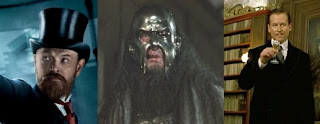Most obviously, the arrival of Sherlock Holmes: A Game of Shadows in theaters last December was an occasion of some welcome. I see that the first Guy Ritchie-directed Holmes adaptation came out during my own hiatus, and thus went uncommented on. I'll just take this opportunity to say that I found it an excellent movie, one that hewed close to the spirit of Doyle's stories, if not being perfectly accurate in every detail.
And I swear the tagline is an amusing coincidence.
The sequel is the pretty much the same, only more so. I do have a few quibbles with it - the liberties taken with the storyline were somewhat more noticeable, given that the film was adapting an existing Holmes story rather than making one out of whole cloth. I was also rather irritated at the fate of Irene Adler in the film, though I take some comfort from the fact that we never saw the body. So to speak.
Holmes and Watson, though, were in top form. Especially gratifying was the expanded use of Holmes' "plot-out-the-fight-in-slow-motion-in-advance" brawling technique, even considering the time that Holmes' meticulous sequence was derailed by a third party throwing a knife. And of course, his final encounter with Moriarty took this form as well, with amazing results. And let's not forget Watson - I especially appreciated his use of deductive reasoning concerning Mycroft's appearance at his "bachelor party", as well as his penultimate confrontation with Colonel Moran.
Finally, I thought Jared Harris' portrayal of Professor Moriarty to be pretty good, with just the right amount of civility papering over seething menace. His plot was refreshingly prosaic, though it reminded me quite a bit - OK, it was pretty much identical - to the Fantom's plot in The League of Extraordinary Gentlemen. And we all know who he turned out to be:
Spoiler: These are all the same character.
Coincidence? Ha!
Anyway, in addition to the cinematic, this spring I also turned my attention to a couple of literary versions of Holmes. The first of these was The Peerless Peer, a crossover adventure with Tarzan written by none other than the creator of the Wold Newton Family himself, Philip Jose Farmer.
To be honest, the book was a bit different than I was expecting. For one thing, there is an element of what I can only call farce about it, what with the motivation for Holmes and Watson chasing down their old enemy Von Bork, namely to secure a new strain of bacterium that has the potential to . . . devastate Germany's supply of sauerkraut. There's also a bit of off-putting characterization, glossed as the story being a presentation of one of Dr. Watson's drafts, released before he cleaned it up for publication. Even with this explanation, though, the oddness when Holmes or Watson don't quite measure up to their traditionally noble portrayals is, as I said, off-putting.
Still, it was still a decent story, and the real point of it - showing off Farmer's theories about the interconnectedness of various stories and characters and how they work in a fictional format - was especially well done. There's an interesting sense of escalation to it, in that the characters we meet get more and more well-known, culminating in the titular Peerless Peer. It's not a terribly long book, but overall an enjoyable one, at least for me.
The other literary Holmes I've been reading recently is the Holmes in Laurie R. King's Mary Russell series, which begins with The Beekeeper's Apprentice. I found this series to be quite interesting so far, for a number of reasons.
Firstly, the viewpoint character is neither Holmes nor Dr. Watson, but an original creation by the name of Mary Russell. Introducing such a new character in such a major role was something of a gamble for King, since such characters - especially young, female ones - are usually received with some skepticism, and for good reason.
Fortunately, though Mary Russell may show some similar tendencies (somewhat hard to avoid when the basis of your story is "What might a female Sherlock Holmes be like? And what if the two of them met?") is hardly as irritating as all that. In fact, I rather enjoyed the "outsider" perception of Holmes, even as it changes throughout the book as Russell becomes better and better acquainted with him.
That perspective is just one of the things that makes this book - and the two sequels I've read - really come to life. Of course, it's a standard conceit of Holmes pastiche that the author is really just editing someone's - usually Watson's - reminisces, and The Beekeeper's Apprentice is no exception. Bringing the setting forward from Victorian to Edwardian England is another change that helps sell the conceit, since it won't interfere with other continuity.
Furthermore, the characterization of the aging Holmes feels really authentic, and even Watson, though he's not onscreen very much and then is often seen through the "bumbler" lens, gets a moment in the second book where he gently chides Russell - and, by extension, Holmes and the reader - for assuming that he needs to be told not to let a hospitalized witness get finished off by medically-disguised assassins. All in all, the series is a decent, if non-standard, take on the Holmes Mythos.











No comments:
Post a Comment